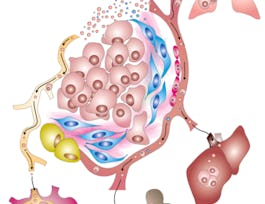This course familiarizes students with the novel concepts being used to revamp regulatory toxicology in response to a breakthrough National Research Council Report “Toxicity Testing in the 21st Century: A Vision and a Strategy.” We present the latest developments in the field of toxicology—the shift from animal testing toward human relevant, high content, high-throughput integrative testing strategies. Active programs from EPA, NIH, and the global scientific community illustrate the dynamics of safety sciences.


Toxicology 21: Scientific Applications
Taught in English
Some content may not be translated
10,405 already enrolled
(80 reviews)
Details to know

Add to your LinkedIn profile
9 quizzes
See how employees at top companies are mastering in-demand skills


Earn a career certificate
Add this credential to your LinkedIn profile, resume, or CV
Share it on social media and in your performance review

There are 7 modules in this course
This model will give you a broad introduction to the Toxicology 21st century (Tox21c) field and familiarize you with the main document, which summarize the main ideas and principles of Tox21c.
What's included
10 videos3 readings1 quiz1 discussion prompt
This module will discuss how ToxCast and Tox21 technologies can be used in practice. The US EPA Endocrine Disruptor Screening Program will be discussed in detail and we will demonstrate how the ToxCast platform replaced in vivo tiered approaches in EDSP and, thus, acelerate the process of . In the second lesson of this module, the development of in silico models for toxicity testing will be discussed.
What's included
10 videos4 readings1 quiz1 peer review2 discussion prompts
This module will familiarize you with the Human Toxome Project run by Johns Hopkins University in collaboration with several university, industry, and research agencies. Omics technologies, their advantages and disadvantages, as well as concepts of Adverse Outcome Pathways (AOP) and Pathways of Toxicity (PoT) will be discussed.
What's included
10 videos2 readings1 quiz1 discussion prompt
The first lesson in this module will explain the concept of read-across, why it is important for regulatory risk assessment, and how it can be implemented by industry in response to REACH legislation. The organotypic cultures lesson will teach you about existing in vitro cell-based models starting from simple monolayer cultures of cell lines and ending with complex combined organ-on-a-chip and human-on-a-chip approaches.
What's included
18 videos3 readings2 quizzes1 discussion prompt
This module will teach you the role of miRNA and epigenetics in toxicology and environmental health.
What's included
6 videos1 reading1 quiz1 discussion prompt
In this module you will learn about important component of in vitro toxicology such as in vitro to in vivo extrapolation (IVIVE) and physiologically based biokinetic modeling. You will learn why it is important to consider biokinetics in vitro and see some example of biokinetics modeling in vitro. This lesson will also give you a biometry prospective of in vitro toxicology. You will learn which methods can be used to analyze big data.
What's included
8 videos3 readings1 quiz1 peer review
In this lesson you will learn about integrated testing strategies and how they differ from individual tests or test batteries. Also a wrap-up lesson "beyond chemical" will summaries your knowledge from this course and give a out-look for further directions in the field of alternatives to animal testing.
What's included
11 videos2 readings2 quizzes
Instructors


Offered by
Recommended if you're interested in Basic Science

Johns Hopkins University

University of California, Irvine

Johns Hopkins University
Why people choose Coursera for their career




Learner reviews
Showing 3 of 80
80 reviews
- 5 stars
81.25%
- 4 stars
10%
- 3 stars
5%
- 2 stars
0%
- 1 star
3.75%
New to Basic Science? Start here.

Open new doors with Coursera Plus
Unlimited access to 7,000+ world-class courses, hands-on projects, and job-ready certificate programs - all included in your subscription
Advance your career with an online degree
Earn a degree from world-class universities - 100% online
Join over 3,400 global companies that choose Coursera for Business
Upskill your employees to excel in the digital economy
Frequently asked questions
Access to lectures and assignments depends on your type of enrollment. If you take a course in audit mode, you will be able to see most course materials for free. To access graded assignments and to earn a Certificate, you will need to purchase the Certificate experience, during or after your audit. If you don't see the audit option:
The course may not offer an audit option. You can try a Free Trial instead, or apply for Financial Aid.
The course may offer 'Full Course, No Certificate' instead. This option lets you see all course materials, submit required assessments, and get a final grade. This also means that you will not be able to purchase a Certificate experience.
When you purchase a Certificate you get access to all course materials, including graded assignments. Upon completing the course, your electronic Certificate will be added to your Accomplishments page - from there, you can print your Certificate or add it to your LinkedIn profile. If you only want to read and view the course content, you can audit the course for free.
You will be eligible for a full refund until two weeks after your payment date, or (for courses that have just launched) until two weeks after the first session of the course begins, whichever is later. You cannot receive a refund once you’ve earned a Course Certificate, even if you complete the course within the two-week refund period. See our full refund policy.



